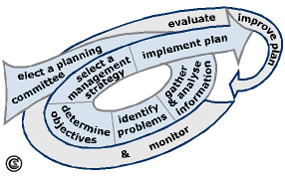Monitor and evaluate
Monitoring and evaluation - two important tasks in Watershed Management planning
Image Credit: Anette Stumptner 2007 after data from Heathcote 1998
Monitoring and evaluation are not ‘the last’ steps as shown in the figure and explained in the following. Monitoring and evaluation are often used together or synonymously. However, it is important to recognise how monitoring differs from evaluation. Although no single definition of monitoring and evaluation exists – and also no standard procedure for carrying it out – some common features can be identified:
Monitoring is the systematic assessment of the progress of a piece of work over time. It is an integral of project management and is a continuous, on-going process for collecting, storing, analysing and using information. Several types exists. Monitoring ends on the completion of a project or programme. An evaluation is the periodic assessment at one point in time of the impact of a piece of work and the extent to which stated objectives have been achieved. It is undertaken by project staff and beneficiaries and, at times, by external teams. Evaluation may be carried out also a longer time after the end of a project [16, 17].
It is necessary that the project team agree on how to monitor and evaluate. Generally, there are two main approaches:
- the orthodox approach: a detailed monitoring system is set up at the beginning and serves as a basis for the monitoring for the duration of the project. This includes the selection of indicators. An indicator is an proxy measurement; i.e. an phenomenon which is easy to measure and which is closely related to the target phenomenon which is difficult to measure (see an example for an indicator in monitoring and evaluation in the Gina River catchment on the following web page).
- the new developed alternative approach: It is a more flexible and adaptable approach. The monitoring system is developed during the project period based on the on-going experiences.
An elaborated system provides both the necessary information for decision making within the project team and also an on-going assessment of how the project is developing [17]. If it becomes clear, that the plan does not result in the intended objectives, then adjustments should be made.



